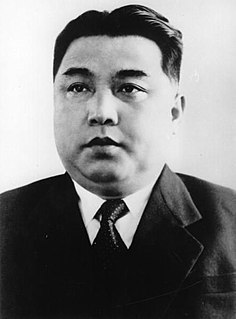A Quote by Joseph A. Schumpeter
Those revolutions are not strictly incessant; they occur in discrete rushes which are separated from each other by spans of comparative quiet. The process as a whole works incessantly however, in the sense that there always is either revolution or absorption of the results of revolution, both together forming what are known as business cycles.
Related Quotes
Taken as a whole, the Chinese revolutionary movement led by the Communist Party embraces the two stages, i.e., the democratic and the socialist revolutions, which are two essentially different revolutionary processes, and the second process can be carried through only after the first has been completed. The democratic revolution is the necessary preparation for the socialist revolution, and the socialist revolution is the inevitable sequel to the democratic revolution. The ultimate aim for which all communists strive is to bring about a socialist and communist society.
It's not uncommon for revolutions to stem from a radicalized group just outside the circle of power. That's what the French Revolution was all about; that's what the American Revolution was. The question is: Will all those groups, because of the nature of partisan polarization and ideological polarization, just fight each other? Or is there capacity to organize?
The word 'revolution' first brings to mind violent upheavals in the state, but ideas of revolution in science, and of political revolution, are almost coeval. The word once meant only a revolving, a circular return to an origin, as when we speak of revolutions per minute or the revolution of the planets about the sun.
First, what is a revolution? Sometimes I'm inclined to believe that many of our people are using this word "revolution" loosely, without taking careful consideration [of] what this word actually means, and what its historic characteristics are. When you study the historic nature of revolutions, the motive of a revolution, the objective of a revolution, and the result of a revolution, and the methods used in a revolution, you may change words. You may devise another program. You may change your goal and you may change your mind.
Physical science enjoys the distinction of being the most fundamental of the experimental sciences, and its laws are obeyed universally, so far as is known, not merely by inanimate things, but also by living organisms, in their minutest parts, as single individuals, and also as whole communities. It results from this that, however complicated a series of phenomena may be and however many other sciences may enter into its complete presentation, the purely physical aspect, or the application of the known laws of matter and energy, can always be legitimately separated from the other aspects.
The quintessential revolution is that of the spirit, born of an intellectual conviction of the need for change in those mental attitudes and values which shape the course of a nation's development. A revolution which aims merely at changing official policies and institutions with a view to an improvement in material conditions has little chance of genuine success. Without a revolution of the spirit, the forces which produced the iniquities of the old order would continue to be operative, posing a constant threat to the process of reform and regeneration.
Even revolution, which transforms a concrete situation of oppression by establishing the process of liberation, must confront this phenomenon. Many of the oppressed who directly or indirectly participate in revolution intend - conditioned by the myths of the old order - to make it their private revolution. The shadow of their former oppressor is still cast over them.
We Marxists believe that a revolution will also take place in other countries. But it will take place only when the revolutionaries in those countries think it possible, or necessary. The export of revolution is nonsense. Every country will make its own revolution if it wants to, and if it does not want to, there will be no revolution.




































